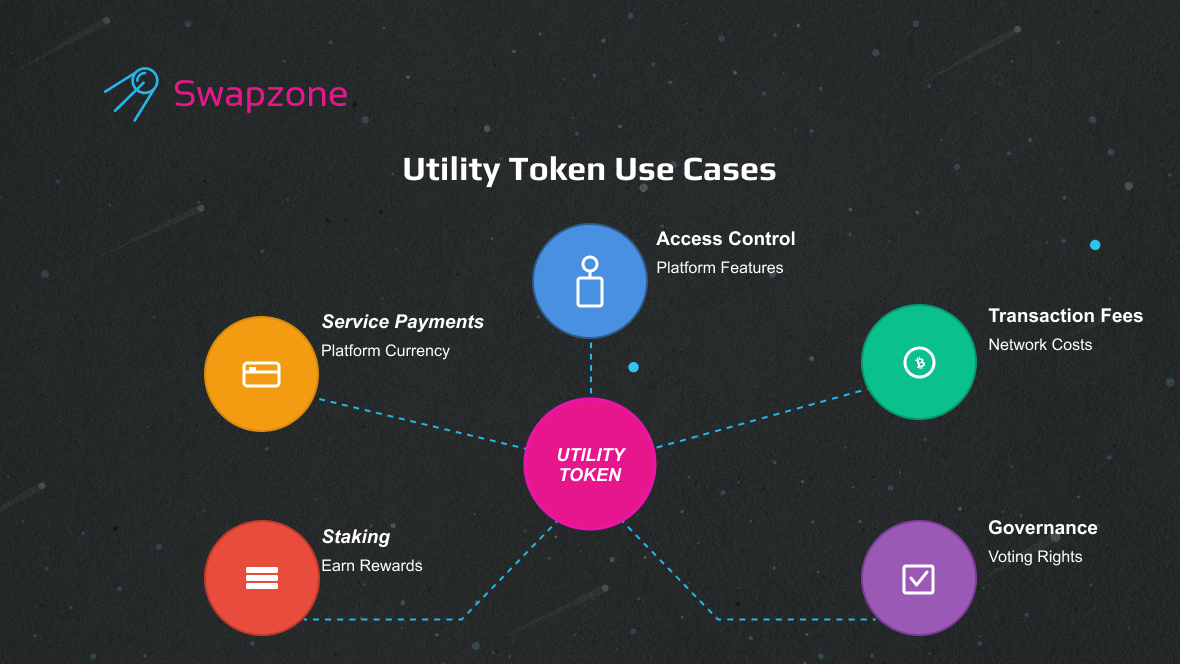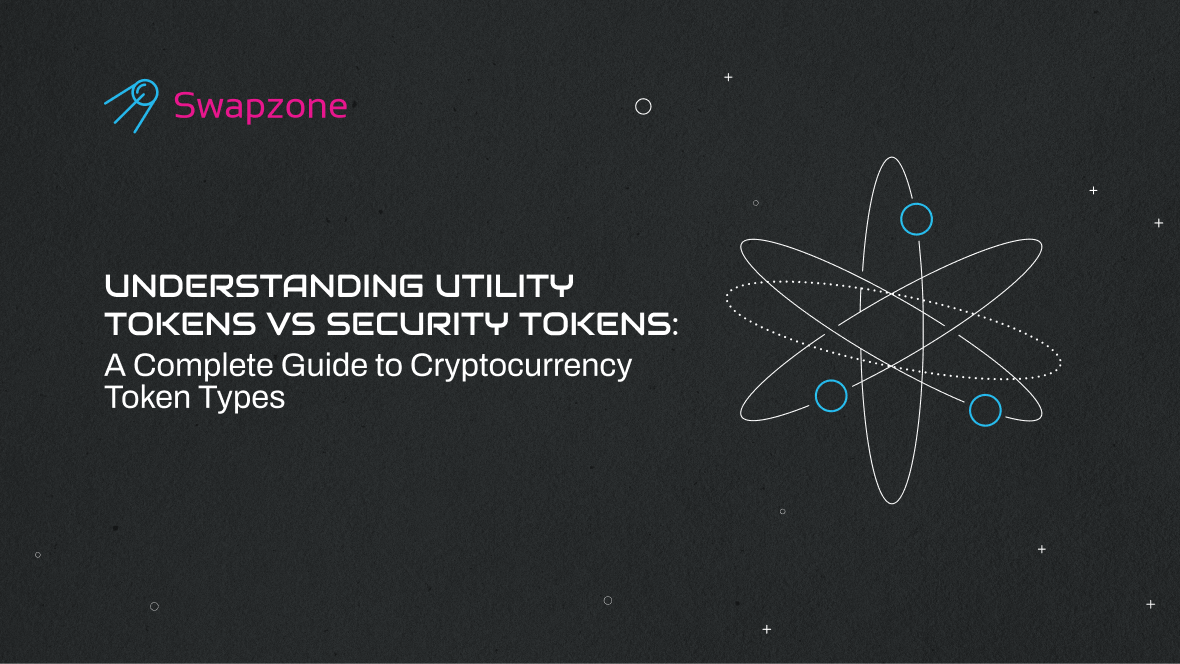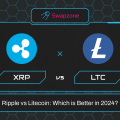Key Points
- What Is a Utility Token?
- What Is a Security Token?
- Utility Tokens vs Security Tokens: Key Differences Between Utility Tokens and Security Tokens
- Examples of Utility Tokens in the Crypto Space
- Utility Token Use Cases: How Utility Tokens Are Typically Used
- Understanding Security Tokens: When Tokens Represent Investment
- How to Navigate Utility Tokens and Security Tokens Safely
- Where to Exchange Utility Tokens and Security Tokens
Most people think “cryptocurrency” means one thing. Here’s the truth: it’s a blanket term covering different types of digital assets. By 2025, with over $35 billion in tokenized real-world assets and clearer regulatory frameworks, understanding token types matters more than ever. Within the crypto space, digital tokens break into distinct categories, with utility tokens and security tokens representing fundamentally different approaches to blockchain technology.
What makes a utility token different from a security token? How do these tokens work within a blockchain ecosystem? Let’s break down everything about these types of tokens.
What Is a Utility Token?
A utility token is a type of token designed to serve specific functions within a blockchain ecosystem. Unlike traditional cryptocurrency that functions as a payment token, utility tokens provide access to services, features, or products within a particular network or decentralized application.
Think of utility tokens as digital coupons with superpowers. They’re not mineable through proof-of-work systems. Instead, these tokens are created all at once during token creation events, then distributed by project teams through initial coin offering (ICO) processes or token sales. The utility token is a type of digital asset that gives holders practical benefits beyond simple transactions.
How Utility Tokens Work
Utility tokens work by granting holders specific rights or access within a blockchain ecosystem. Many utility tokens are issued through ICO campaigns where projects raise funds. The token issuance process typically happens through smart contract protocols on platforms like Ethereum.
Once issued, utility tokens grant access to platform features, enable users to participate in governance decisions, or allow holders to stake tokens for rewards. The value of utility tokens depends on network adoption and the utility they provide.
What Is a Security Token?
A security token is different. Security tokens represent ownership in real-world or digital assets, verified through blockchain technology. Think stocks, bonds, real estate shares–but on the blockchain.
Security tokens are subject to federal securities regulations and must comply with the Howey Test. In 2025, major institutions like BlackRock and Franklin Templeton have launched SEC-registered tokenized funds, bringing legitimacy to the space. Unlike utility tokens, security tokens may generate profits through dividends, profit-sharing, or asset appreciation. The issuance of security tokens requires strict regulatory compliance, including registration with authorities and transparency with token holders.
Security tokens represent ownership stakes in companies, assets, or investment vehicles–bringing blockchain’s benefits like instant settlement and fractional ownership to conventional finance.

Utility Tokens vs Security Tokens: Key Differences Between Utility Tokens and Security Tokens
Understanding the difference between utility tokens and security tokens is crucial for navigating the crypto world. These types of tokens serve fundamentally different purposes.
Purpose and Function
Utility tokens offer access to specific services within a platform. They enable users to participate in network activities, pay transaction fees, or unlock benefits. The primary purpose of utility tokens is to grant functionality, not investment returns.
Security tokens represent ownership interests and function as investment vehicles that may generate returns through profit-sharing or dividends. Security tokens are subject to securities regulations.
Regulatory Status
Utility tokens exist in evolving regulatory spaces. While the 2025 SEC guidance and GENIUS Act have brought more clarity, distinguishing utility from security tokens remains crucial to avoid regulatory issues and potential scam activities. Security tokens are subject to strict regulations, requiring compliance with securities laws and the Howey Test. This provides more security for investors but creates barriers for projects.
Value Determination
The value of utility tokens depends on network adoption and ecosystem growth. These tokens are typically valued based on their use case rather than company performance.
Security tokens tie directly to the issuing company’s valuation. The value of security tokens moves with company fundamentals and market conditions, similar to traditional stocks.
Access and Ownership
Utility tokens provide access to blockchain ecosystem features–paying fees on the Ethereum network, accessing services, or using decentralized applications. Many utility tokens grant voting rights or staking opportunities.
Security tokens represent ownership stakes. Holders of utility tokens get access; holders of security tokens get equity.
Examples of Utility Tokens in the Crypto Space
Let’s look at real examples of utility tokens to understand how these tokens work in practice.
Binance Coin (BNB)
Binance Coin is one of the most successful examples of utility tokens. The utility token of the Binance ecosystem, BNB was initially created for discounted trading fees. Today, BNB’s utility tokens are used for paying transaction fees, participating in token sales, booking travel, and accessing various services within the Binance ecosystem.
BNB demonstrates how utility tokens play vital roles beyond their original design, enabling functions across Binance’s expanding blockchain ecosystem. Users use utility tokens like BNB to access to specific services, participate in governance, and use to pay for goods.
Basic Attention Token (BAT)
The Basic Attention Token revolutionizes digital advertising through blockchain technology. BAT tokens are digital assets that reward users for viewing ads while allowing advertisers to buy attention directly. This utility token of the Brave browser creates a more efficient advertising model.
It’s a perfect example of how utility tokens are often used to realign incentives within an ecosystem. Users hold BAT tokens as compensation, advertisers purchase utility tokens for access, and creators receive tokens as payment.
Ethereum Gas and Other Examples
While ETH is cryptocurrency, gas tokens on the Ethereum network function as utility tokens. Users must hold ETH to pay fees on the Ethereum network for smart contract operations. This demonstrates how utility tokens serve essential infrastructure purposes.
Examples of utility tokens include Harmony’s ONE token for network fees and staking, Siacoin (SC) for decentralized storage payments, and Lisk (LSK) for powering decentralized applications. Meanwhile, security tokens now include tokenized U.S. Treasuries (like BlackRock’s BUIDL) and real-world asset tokens representing real estate and private credit. Many utility tokens have emerged across blockchain projects, each serving unique purposes within their specific ecosystems.
Utility Token Use Cases: How Utility Tokens Are Typically Used
Understanding specific utility token use cases clarifies why these tokens are created and how they function.
Access Control and Transaction Fees
One primary use case: utility tokens grant access to platform features. Token holders might access premium features, exclusive content, or special services. This access control ensures only committed users access certain functionalities. Utility tokens provide access to specific services while creating natural barriers.
Many platforms use native tokens for transaction fees. When you interact with a blockchain ecosystem, you need the platform’s utility token to pay processing costs. This creates consistent demand and utility within the ecosystem. Users to participate must hold tokens, ensuring circulation and inherent value.
Governance, Staking, and Payments
Governance tokens are a special type of utility token enabling decentralized decision-making. Token holders vote on protocol changes or strategic directions. The tokens serve as voting shares in decentralized autonomous organizations, distributing power among holders.
Utility tokens are often used for staking mechanisms that secure networks and generate rewards. Holders lock tokens to support operations, earning additional tokens. This creates incentive alignment between holders and network health.
Within the ecosystem, utility tokens often function as primary payment for platform services. Whether renting storage space, accessing computation, or using features, the native utility token serves as currency. This creates closed-loop economies where tokens circulate within their intended ecosystems–a specific utility driving adoption and use.
Understanding Security Tokens: When Tokens Represent Investment
While utility tokens are not intended as investments, security tokens explicitly function as investment vehicles. Understanding this distinction matters.
Security tokens demonstrate clear investment characteristics–offering profit-sharing, dividends, or appreciation tied to underlying assets. This investment nature triggers securities regulations. Companies issuing security tokens must register offerings, provide disclosures, and maintain compliance.
Unlike utility tokens operating in loosely regulated spaces, security tokens are subject to strict oversight. This clear regulatory framework reduces scam risk but adds complexity and cost for issuers.
Security tokens excel at representing real-world assets on blockchain infrastructure. Real estate, company equity, commodities, or debt can be tokenized as security tokens. The tokens are digital assets carrying legal rights and obligations. Holders receive the same protections as traditional security holders, with blockchain’s additional advantages like 24/7 trading and fractional ownership.
How to Navigate Utility Tokens and Security Tokens Safely
Whether exploring utility tokens or security tokens, understanding security considerations protects your investments.
Before purchasing tokens, research thoroughly. Examine the team, use case, token economics, and community. Look for red flags like anonymous teams or unrealistic promises. For utility tokens, verify that utility token use cases make sense and the platform actually needs a token.
Know how tokens are subject to regulation in your jurisdiction. Security tokens carry clear legal frameworks, while utility tokens operate in gray areas. If issuing utility tokens, consult legal experts to avoid inadvertently creating a security token requiring registration.
For utility tokens, ask: Does this serve genuine purpose? Utility tokens grant specific capabilities–verify those exist and matter. A utility token is a type of digital asset that should solve real problems. If the platform works without the token, question its value.
Token value depends on multiple factors. For utility tokens, adoption rates and ecosystem growth drive value. For security tokens, underlying asset performance dominates. Research tokens may be affected by manipulation, low liquidity, or concentrated ownership.
Start small when exploring new types of tokens. Many utility tokens have extreme volatility. Security tokens may be more stable but still carry risks.
Where to Exchange Utility Tokens and Security Tokens
Looking for a reliable platform that allows users to swap tokens efficiently? Swapzone aggregates rates from multiple exchanges, giving you access to competitive pricing for thousands of utility tokens and cryptocurrency pairs.
Whether you’re exploring the latest utility tokens, established tokens like Binance Coin, emerging RWA tokens, or need to access a blockchain ecosystem through its native token, Swapzone simplifies the process. The platform that allows users to compare rates across exchanges ensures you get the best deal without creating accounts on multiple platforms.
The swap process is straightforward:
- Select the crypto you want to exchange and the utility token you want to receive
- Enter the amount and review multiple exchange offers
- Choose your preferred rate and partner
- Complete the swap by providing your wallet address
- Receive your tokens directly to your wallet
No registration needed. No complex verification processes. Just straightforward token swaps when you need them.
The Future of Utility Tokens in Blockchain Technology
As blockchain technology evolves, utility tokens continue playing crucial roles in decentralized ecosystems. In 2025, the tokenization market reached $30+ billion, with institutional adoption accelerating. New utility tokens launch regularly, each attempting to solve specific problems.
The distinction between utility tokens and security tokens will likely sharpen as regulations mature. Clearer frameworks will help legitimate projects thrive while protecting investors. Both token types have roles in the expanding crypto world.
Utility tokens enable innovation in decentralized governance, micropayments, and access control. They allow projects to create customized economic models aligning incentives between users, developers, and networks. The tokens are typically most successful when solving real problems rather than creating unnecessary complexity.
Key Takeaways: Utility Tokens and Security Tokens
Utility tokens enable specific functions within blockchain ecosystems. They grant access to services, allow users to participate in governance, and power decentralized applications. These tokens serve practical purposes beyond investment returns. Examples of utility tokens include BNB, BAT, and numerous platform-specific tokens across the crypto space.
Security tokens represent ownership in assets and function as investment vehicles. They’re subject to securities regulations and tie value directly to underlying assets. Security tokens bring traditional finance into blockchain infrastructure with enhanced efficiency.
The key differences between utility tokens and security tokens boil down to purpose, regulation, and value drivers. Utility tokens provide utility; security tokens provide ownership. Both types of tokens have legitimate uses, serving different needs.
Understanding these distinctions helps you navigate the crypto world more effectively. Whether using utility tokens to access platform features or considering security tokens for investment portfolios, knowing what you’re dealing with makes the difference.
Ready to explore utility tokens? With 2025’s clearer regulations and institutional adoption, now is an exciting time to participate. Start comparing rates through Swapzone’s aggregated exchange platform. It’s the fast, simple way to access thousands of tokens without multiple account registrations. The crypto space continues evolving, and both utility tokens and security tokens will shape that evolution.


